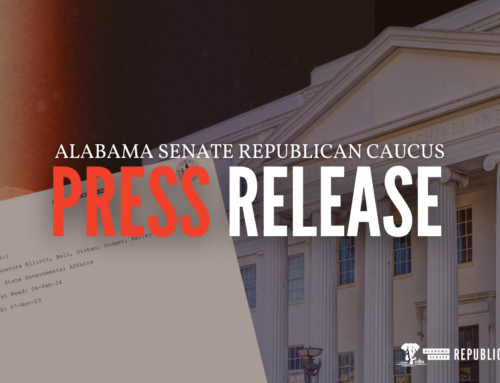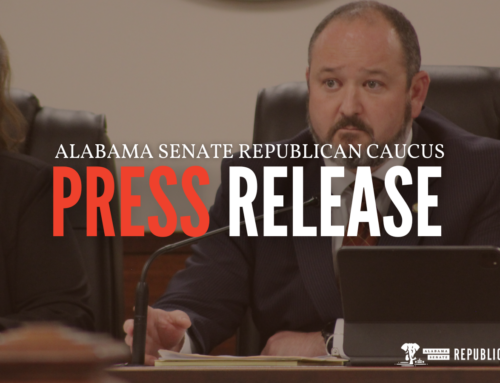MONTGOMERY, Ala. – The Alabama State Senate today passed legislation sponsored by Senator Greg Reed (R-Jasper) and Representative Bill Poole (R-Tuscaloosa) to reauthorize the Jobs Act and the Growing Alabama Act – two of Alabama’s primary state-wide economic development programs that expired in 2020.
The legislation passed the House February 4, 2021 by a 94-1 vote. The bill passed the Senate today by a unanimous vote.
“The ability to recruit jobs and businesses to Alabama is critically important to the future of our state as we continue to grow our economy, and this priority legislation gives us the tools to support that mission,” Senator Reed said. “Supporting job growth and industrial development is the number one way that we can create a higher quality of life for Alabamians and allow our state to meet its full potential. Our neighboring states, as well as states across our country, are constantly looking for ways to recruit and attract economic investment opportunities. This bill gives Alabama the ability to be competitive in that process.”
“These economic development incentives that are being renewed and sharpened have proven to be essential tools in our toolbox when it comes to recruiting and expanding industry across Alabama,” said Rep. Bill Poole. “And because these incentives are performance based in terms of requiring the creation of new jobs and attracting new investment, our citizens can be assured that these incentives are a sound investment in Alabama’s economy and the future prosperity of our citizens.”
“As one of the first bills to pass this session, this legislation sends a strong message that Senator Greg Reed’s priority as the new Pro Tem is to move Alabama forward,” Governor Ivey said. “I applaud Senator Reed, members of the Alabama Senate, and Chairman Bill Poole, who led this effort in the House, for the significant action today to ensure we can recruit and retain good-paying jobs on behalf of the people of Alabama.”
“I wish to express my deep gratitude to Governor Ivey for her commitment to growing well-paying jobs for Alabamians and to President Pro Tem Greg Reed and Chairman Bill Poole for their leadership in marshaling the Commerce incentive legislation through the Legislature as our Bill sponsors,” Secretary of Commerce Greg Canfield said. “These incentives will go far in our continued efforts to create new investment and new jobs at a time we need them most for the people of Alabama.”
Background on this bill:
The Jobs Act
The Jobs Act provides incentives for companies to expand or locate in Alabama. In general, a company must create 50 jobs to be eligible and can receive 3% of last year’s wages in cash, as well as a 1.5% tax credit for capital investments. Each of these incentives is available for ten years.
The updated Jobs Act raises the previous $300 million incentive cap to $325 million in 2021 and $350 million in 2022. Underrepresented companies would be eligible to receive enhanced incentives. These companies are ones owned by women or African Americans, or small businesses located in low-income communities eligible for new markets tax credits. They would be eligible for a 4% jobs fee, instead of the standard 3%, and they would only have to create 10 new jobs instead of the standard 50.
The existing enhanced incentives for technology companies would be changed, so that a company has to create 10 new jobs instead of 5 new jobs. The jobs fee will go from 5% to 4%, but the investment credit would be available. This brings technology companies closer into line with rural projects.
Pharmaceutical-related businesses would be eligible for a 4% jobs fee instead of the standard 3%. They would still need to create 50 new jobs to qualify.
The Growing Alabama Act
The updated Growing Alabama Act provides a funding mechanism for certain special projects. After approvals by the Commerce Department and the Renewal Commission, a project is funded by private donors, who receive a tax credit for making the donations. The Growing Alabama Act program has been used to make site improvements that were key to several economic development projects around the state, including at industrial and research parks.
The previous $10 million per year cap for the program will be raised to $20 million, and it reserves $5 million to be allocated in the first six months of the calendar year for rural counties and up to $4 million for technology accelerators. The program will be available to fund site improvements in low-income communities eligible for new markets tax credits, as well as providing mentorship and support programs for underrepresented businesses. The bill also clarifies the types of technology companies which would be able to participate in accelerators.
Banks, insurance companies, and public utilities would be able to participate in the Growing Alabama Program by allowing credits to offset taxes that they pay. Pass-through entities would also be able to participate.
The Port Credit
The Port Credit will be extended to the shipping of vehicles to support the shipment of Alabama-manufactured automobiles out of the port of Mobile.







